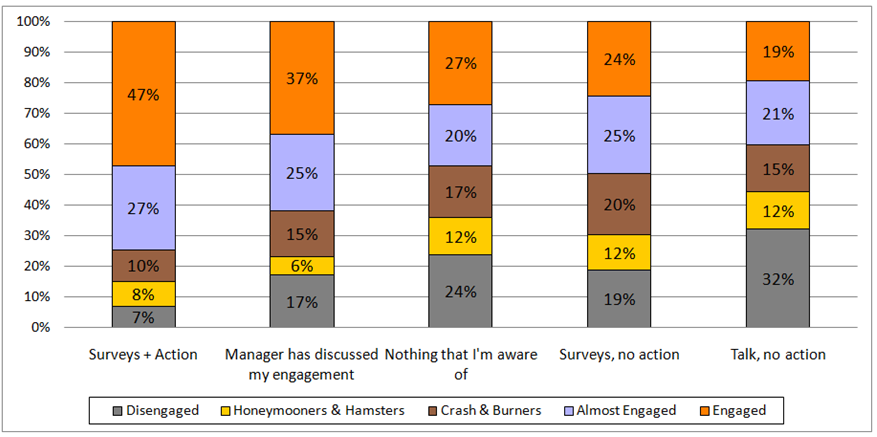I work with many organisations that have made a significant investment in money and resources, over multiple years on large unwieldy surveys producing tons of data but making very little impact on increasing or sustaining engagement.
Engagement surveys are a useful and valuable diagnostic, they take a ‘temperature check’ of the organisation at point in time, but they alone are not the answer to effective and sustainable engagement. Use them to kick off your engagement journey to where the organisation needs to take action, find out where are the problem areas are and what issues the organisation need to address and how can you get alignment between satisfaction and contribution to the business to improve performance.
Beware – Don’t make the survey so vast that you get stuck in analysis paralysis and never get any further. You can achieve actionable results by doing “less, less, more, more”.
1) Less focus on external benchmarks. Organisations are finally realising that the goal of a survey isn’t to compare their results against the competitor down the road. If your competitor is only at 49% – do you really want to compare?!
2) Less items in the survey. Organisations are moving away from 90 question surveys that take half an hour to complete. A survey should have no more than 40 questions and these should be actionable so that the follow up is focused to making improvements.
3) More than once every year (or two). Many organisations run pulse surveys or shorter surveys more often to check on results and action. If you want to use employee engagement insights to guide your business strategy and performance, you need fresh, accurate data. Your seniors leaders don’t look at the financial or customer data once a year, they analyse trends monthly to ensure the organisation is meeting goals and targets.
4) More tied to strategy. The implementation of a survey must link directly back to the organisation strategy, vision and goals — from the launch communications through to the reporting of results to actions at the individual, manager and executive level.
Don’t embark on a survey if you are not prepared for action! If the organisation is not prepared for the action that follows a survey – don’t do it! If the senior team does not support it, or the framework and support is not in place you will do more damage than good. Our recent research tells us that running a survey without visible follow-through and action will actually reduce engagement levels in your organisation.

BlessingWhite Engaement Report Research http://www.blessingwhite.com/research.asp?pid=1
One broad-brush HR initiative won’t deliver lasting results. It is important to gain support from your key stakeholders, senior leaders and approach the follow up actions at three different layers of the organisation – the individual, the manager and the executive.
Individuals must own their engagement. They cannot expect HR or the organisation to provide a blanket formula that will fit their unique needs. Employees need to be clear on their own core values, engagement drivers, motivators and goals and they must take the initiative to apply these to the business’s goals.
Managers can't make employees engaged, but they can act as coaches to facilitate and support their team members' engagement journeys. Managers need to understand the unique interests, talents, and aspirations of their employees. They then need to align these with the organisational priorities and projects.
Executives also have an important and specific role to play. Besides setting the organisations strategy and direction, their focus must be on creating a culture that fuels engagement and performance. Senior leaders must “walk the talk” by demonstrating their own engagement, sharing their belief and passion in candid, consistent communications.
Don’t make it another action at the bottom of the to do list. A strong culture of employee engagement is an essential element to an organisation achieving its business performance and results. Engagement cannot be delegated to a group in the organisation to sort out – engagement at all levels need to be incorporated into daily practices and behaviours.











2 Responses
Apologies for lack of line feeds in the previous comment …
C'mon HRZone, what about an post-posting edit facility?
Once a year?
The issue of survey timing seems to be quite important. Do you run the survey before the depressing low pay rise announcement, or after? During a period of change, or not? During holiday season? How long do you run it for? How often do you run it? How often should you run pulse surveys?
There are no good answers. So why bother to ask the questions at all? By moving to an always-on survey, available 24×365, all these vexing questions suddenly become completely irrelevant. No more finagling the date to try to get the best possible results … no more fiddly pulse surveys … no more annual setting-up angst, or scrambling to get results out, or grand action plans which often fail …instead, a self-service, simple, continuous survey, with instantly-available ever-fresh analyses, resulting in smaller, better targeted initiatives aimed at continuous improvement.
What's not to like?
Hugh Tonks
CEO, Thymometrics
http://www.thymometrics.com